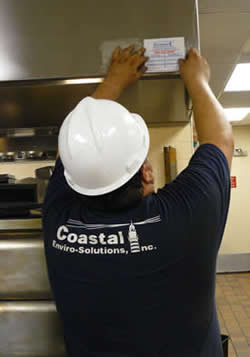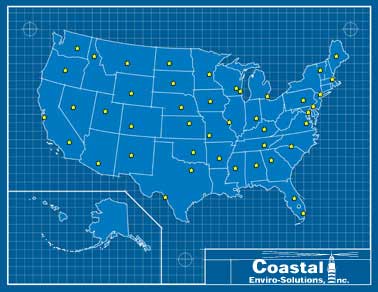Certification
Boston Certification:
In August of 2007, a fire in West Roxbury took the lives of two Boston City Fire Fighters.
The fire ignited in the kitchen and spread into the kitchen exhaust system, where it burned in the duct work for over an hour. The resulting investigation revealed serious deficiencies in the kitchen exhaust system, and a failure to properly clean and maintain the system.
In response to this, the Boston City Council passed an ordinance that will require certification for exhaust cleaners that do any work in commercial kitchens within the City of Boston. Boston contacted the International Kitchen Exhaust Cleaning Association (IKECA™) to develop and implement a certification protocol to meet the needs of the city. IKECA™ developed two unique certifications for the City:
The Boston Certified Cleaning Specialist™ (BCCS™) and The Boston Certified System Inspector™ (BCSI™).
IKECA's Involvement
IKECA™ is an approved certification body for the Fire Department's program, and will design and administer the exams for the City. IKECA is a 20 year old trade association, representing kitchen exhaust cleaners and inspectors all over the world.
The Boston Fire Department along with Inspectional services and the Health Department has established a criteria of conditions for Exhaust Vent Cleaners and Inspectors who wish to perform work in the CITY OF BOSTON. These conditions are in keeping with the guidelines of the CITY OF BOSTON ordinance to “establish requirements for the cleaning of commercial cooking hoods and ventilation systems”.
Exhaust Vent Cleaners and Inspectors are required to pass an examination based on the most current NFPA 96 standard recognized by the Commonwealth of Mass.
This examination will be administered by a recognized organization www.ikeca-boston.org that has proven to be of high standards, integrity and competence with regard to NFPA 96 regulations. The Boston Fire Department will list other recognized agencies that may administer the examination after careful review of their qualifications.
Individuals who have successfully passed the examination will also be required to submit documentation of five hundred (500) work hours experience in the cleaning and inspecting of exhaust vents. To waive this requirement the individual must have attended a recognized and approved training school.
Individuals who apply for an annual registration will be issued guidelines for reporting deficiencies found, posting of inspection stickers and other administrative requirements.
Effective May 9, 2009 all companies/contractors engaged in the cleaning of commercial kitchen exhaust systems within the City of Boston are required to have at least one person on each work crew successfully certified as a Boston Certified Cleaning Specialist (BCCS).
The City of Boston Fire Department also requires any contractor engaged in the inspection of any commercial kitchen exhaust system be successfully certified as a Boston Certified System Inspector (BCSI).
What should I as a restaurant owner know?
|
Deficiency Reports:
Advisory to all Exhaust Vent Cleaners and Inspectors
Be advised that all commercial hood and ventilation cleaning companies/contractors performing work in the city of Boston are required by law to issue deficiency reports to the establishment owner when they do not comply with NFPA 96 mandated repairs and also if there is no onsite exhaust system diagram. All deficiency reports must be given to the establishment and a copy forwarded to the Boston Fire Department - Fire Prevention Division by following the instructions listed on our website.
Commercial hood and ventilation cleaning companies/contractors must also report to the Boston Fire Department – Fire Prevention Division when an establishment in Boston does not renew their contract or if your company did not clean the hoods and ventilation systems by the scheduled date required in NFPA 96.
The Boston Fire Department’s Sample Cleaning and Inspection of Commercial Hood and Ventilation System & Deficiency Report has been updated, please revise your deficiency report to the form dated August 2010. All related information and required forms can be obtained by contacting the Boston Fire Department.
__________________________________________
If you have questions concerning the regulation, or compliance issues, please contact the Code Compliance Desk at 978-567-3375, or in western Massachusetts at 413-587-3181. The City of Boston has its own requirements. Contact the Boston Fire Department if planning to work in Boston. The regulation requires a frequency of inspection, as established by NFPA 96 and Table 11.4. Based on the results of the inspection, a determination is made by the inspector if the system needs to be cleaned. What should I as a restaurant owner know?
____________________________________________________________________________________ |
Hood Labels That Are Required To Be Affixed To Hood After Each Cleaning: Labels are to be fixed to commercial cooking equipment, in accordance with NFPA 96 section 11.6.13 and further, the content, size, design and placement shall be prescribed by the State Fire Marshal. The regulation requires the head of the fire department to issue a cease and desist order at any facility that has not had an inspection within the past twelve months, in accordance with Table 11.4. Two Types of Licenses in The State of MA There are two levels of certificate of competency available. A restricted certificate of competency (Type 2) for owners that would like to clean their own commercial cooking operation and a unrestricted for those holding themselves out to the general public for business (Type 1). Both of these certificates require that the individual pass a written examination offered by the State Fire Marshal’s Office. Type 1: This Certificate of Competency is issued to those individuals who are in the business of cleaning and inspecting commercial cooking exhaust systems. Requires that the individual have inspected and/or cleaned commercial cooking exhaust systems for a minimum of 500 hours within the past six (6) months. Type 2: This “restricted” Certificate of Competency is issued for those individuals who conduct cleaning activities for commercial cooking operations that they own or operate. Currently there is no fee for the license or license exam, but the regulation allows for one to be established. Restricted License for Cleaning Own Premises Only The owner or operator of a commercial cooking operation, or employee thereof, shall not be prohibited from conducting the actual cleaning and grease removal of hoods, grease removal devices, fans, ducts and other appurtenances in their own commercial cooking, as long as the owner or operator holds a “restricted” Certificate of Competency. The restricted Certificate of Competency does not allow the holder of the certificate to conduct cleaning services for other commercial cooking operations. Owners and operators will still need to have an individual holding a Type 1 Certificate of Competency conduct all inspections Inspections Must be Done by Type 1 License Holders Inspections must be done by holders of a Type 1 license. Holders of the Type 2 restricted licenses cannot perform inspections, only cleaning of systems on their own property. Board of Examiners of Sheet Metal Workers: The Division of Professional Licensure in accordance with the Chapter 232 of the Acts of 2008 are now required to provide oversight and licensure of sheet metal work, including commercial cooking operations. Notice of Non-Compliant Systems If a person holding a certificate of competency finds a commercial cooking operation not in compliance with 527 CMR 11, related to grease build up shall notify the local fire department with 48 hours, on a form prescribed by the marshal and provide a copy to the owner of the system. Records Records of each inspection and cleaning activity shall be produced by the person holding a certificate of competency. The regulation prescribes the minimum information that must be contained on the inspection and cleaning forms. The owner or operator of a building and the person holding the certificate of competency shall maintain the records for at least three years. |






